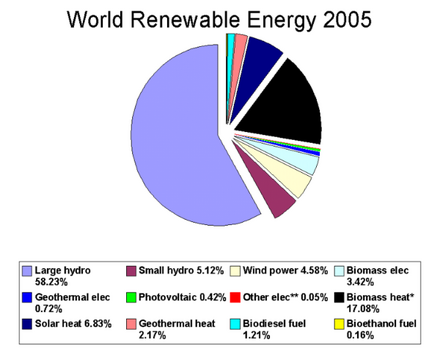|
English · Español |
|
|
Renewable energy is energy derived from resources that are regenerative or for all practical purposes cannot be depleted. For this reason, renewable energy sources are fundamentally different from fossil fuels, and do not produce as many greenhouse gases and other pollutants as fossil fuel combustion.
Mankind's traditional uses of wind, H2O, and solar energy are widespread in developed and developing countries; but the mass production of electricity using renewable energy sources has become more commonplace recently, reflecting the major threats of climate change due to pollution, exhaustion of fossil fuels, and the environmental, social and political risks of fossil fuels and nuclear power.
Many countries and organizations promote renewable energies through tax incentives and subsidies. Types of renewable energy include
- Wind power
- Water power
- Solar energy use
- Biofuel
- Liquid biofuel
- Solid biomass
- Biogas
- Geothermal energy
World renewable energy 2005[]

World renewable energy - 2005 data (except 2004 data for items marked* or **). 'Other elec' means electricity from solar thermal power and tidal power. Rural domestic off-grid renewables are excluded. Energy recovered by ground source heat pumps is excluded. Bioethanol energy content taken as 19.8 MJ/l. Biodiesel energy content taken as 34.5 MJ/l.
Image credit: Gralo
News Europe[]
- February 1 2006, Wind Energy in Europe - EC White Paper targets for 2010 surpassed
Resources[]
- House of Lords European Union - Twenty-Seventh Report, The EU's Target for Renewable Energy: 20% by 2020, October 24 2008, HTML version (browsable)
- Wind power in the UK, Sustainable Development Commission, May 2005
- Wind Power: Your Questions Answered, for householders, Sustainable Development Commission, May 2005
Village cinema[]
Related topics[]
Related Wikipedia content[]
UK links[]
- Energy 21 Network of grassroots renewable energy groups
- Yes2wind
- Urban Wind Energy
- British Wind Energy Association
| This page uses Creative Commons Licensed content from Wikipedia (view authors). |


